Kraken Academy Interview: Happy Broccoli Games Talks Influences, Design, and Marketing for Indies
Kraken Academy released for PC yesterday after a unique development cycle. It began as a project by one individual with no prior coding experience, but by the end was spearheaded by a primarily three-person team with backing by two publishers and the government of Berlin, Germany. Indie game creation can take many forms, but for developer Happy Broccoli Games the process involved a lot of creative measures meant to foster what the team feels is most exciting when looking toward upcoming releases.
Game Rant spoke with Happy Broccoli Games' founder Annika Maar and marketing manager Irene Preuss about the casual adventure game Kraken Academy's art direction, development process, and humorous blend of the supernatural and mundane. Interview has been edited for clarity and brevity.
Q: I understand Kraken Academy began as a solo project for you Annika, how did it get started?
Maar: I was developing the game for two years on my own. One night I just woke up and was like, "Oh my god, I want to make this game. I'm going to combine Majora's Mask and this crazy school idea I've had before. I'm just going to teach myself how to code, and it's going to be fine." So I started out in GameMaker, and it took me two years to make a prototype that was 10-minutes long. This was just on my weekends, without any funding.
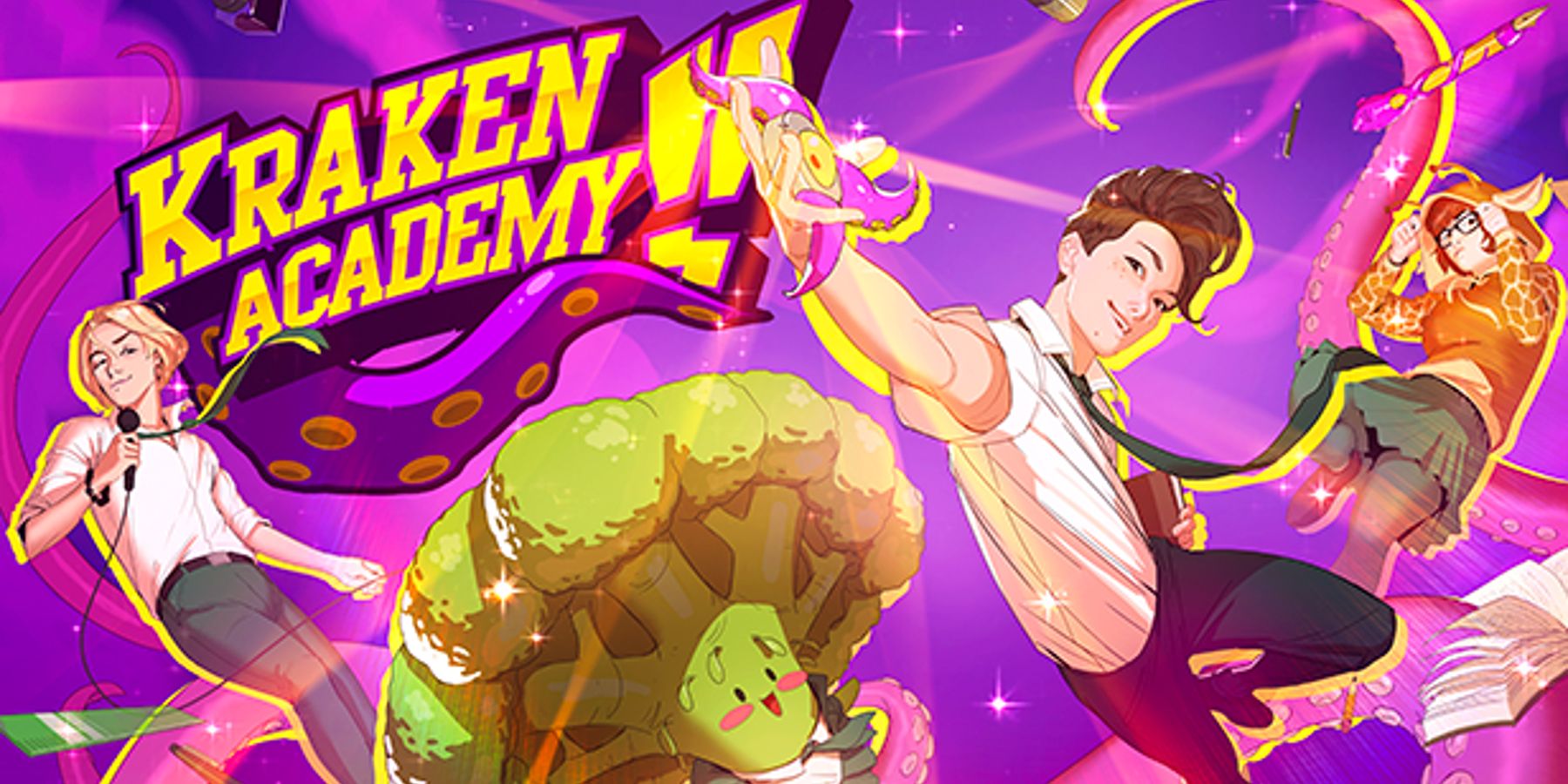
Then I went to a co-living space in Sweden where I met Joni Levinkind, our programmer, and I managed to convince him to work on the game using the prototype. Later on, Irene joined the team.
Q: So how long have you had the idea that you just woke up and decided to work on?
Maar: I had the two years I was working on it, but before that probably another year. It used to be an idea for a comic - it was quite different back then. It was something my sister and I were working on together. But then we never finished it, so I thought making the game instead of this comic would be more interesting to me, so I switched over.
Q: I'd assume you were leaning in the direction of a comic at first because of your experience as an illustrator?
Maar: Yeah exactly, it's just that I thought because I can draw, I should be able to make comics. But I wasn't very good at it, I have to say. It's two very different things to make a comic versus an illustration. So I thought if I told the story through a game it might work out better, and it did work out a lot better. I found I'm much better at making games than I am at making comics.
Q: And so you started picking people up in Sweden-
Maar: Yes, I went around shopping there.
Q: How did the game grow, leading up to Irene joining?
Maar: It was Irene who introduced us to Coffee Stain, they have this funding system for underrepresented devs called "Leveling the Playing Field." That's where we got our funding, and we noticed quite quickly that we needed another marketing person. It just took up so much time, and we didn't have the connections that we needed. We were very lucky that at the time Irene had just quit her job.
Preuss: The project also picked up some funding from the government, and the plan was to work on the game for one year and have it release around now, in summer 2021. Together with Annika we worked on a marketing plan, that way she could mainly focus on developing the game, making the art, and writing. Joni could focus on the programming, and I focus on the marketing side. It worked really well to have this separation, for sure.
Maar: Super good. I'm super glad to have Irene.
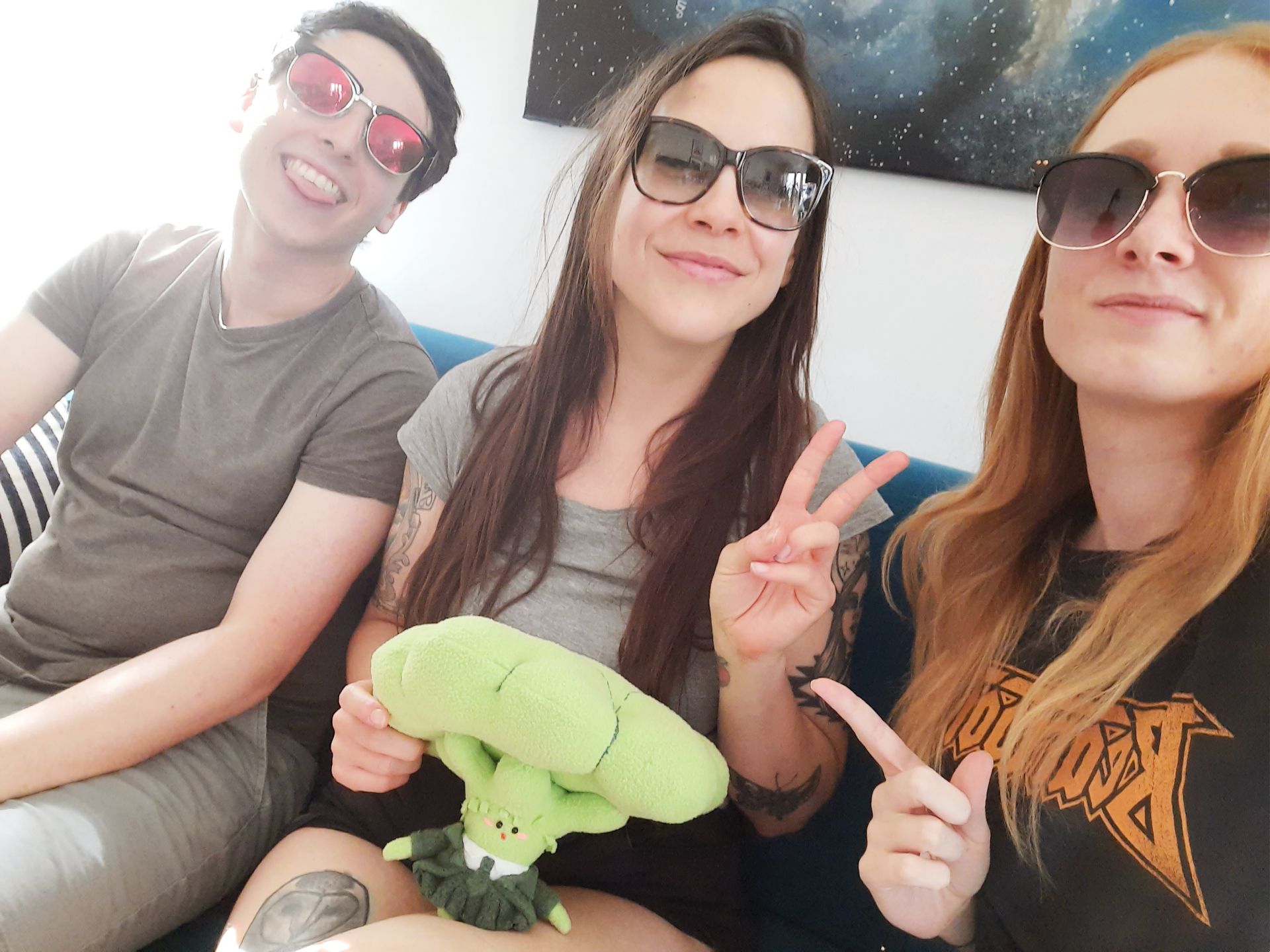
Q: There are other contributors listed on the game's website. How much has the scope of the game expanded since the funding round?
Maar: Not much to be honest. The other team members you see are freelancers, they've done the audio for the game.
In terms of content that's grown because of extra people, the only thing really was boss fights. There weren't any action sections in the game, but we felt it was a bit anti-climactic, and we wanted something extra. We thought having these boss fights that are a bit more grand would be cool. Other than that, it pretty much stayed the same.
Obviously, having this funding, I think especially the marketing side grew a lot. Having an extra team member and things like an animated trailer, as you probably saw. That hand-animated bit is very expensive, and we would not have the money for it otherwise. Also voice acting, even though the game isn't fully voice acted. We have little snippets here and there, like when you unlock them they say their line and they make some sounds. Even something that simple can be pretty expensive, you have to budget for it.
Q: Beyond those more action-oriented segments, what's the general idea you were going for?
Maar: The loop, let's say, is the game is split into different clubs centered around art, music, drama, and sports, and each time you unlock a new club. So you go into the art club, for example, you get to know these characters and new area with its dynamics. Then, you have to do what I'll call a pre-dungeon section where you take on a quest in the overworld. Since we have time, it's like on Monday night you have to meet up with someone, go to extra art lessons or whatever it is. Then you can go to the exhibition.
After that we have the dungeon bit, I'll call it, where you go in and time stops. You have to do this one section, and in this case it'll be a court case about a painting that was vandalized. You have to find out who did that, and you are essentially stuck in there until you solve it - but you don't have to worry about the world ending in there, which is very nice.
We didn't want it to be super stressful for people to have the pressure of time. You can take your time doing that, and after you're done with these quests you'll have a big boss fight that gives you a nice finale.
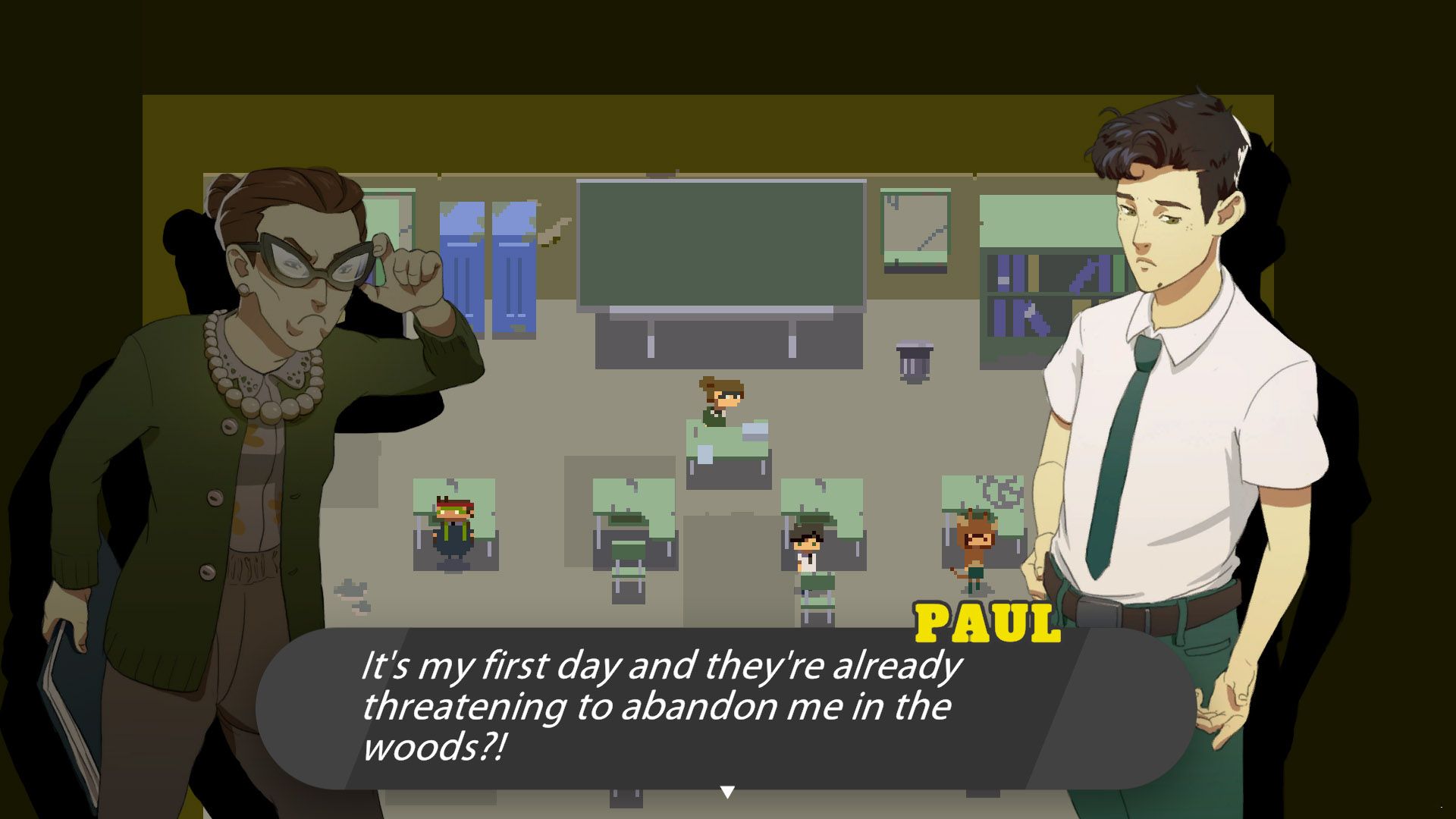
Preuss: The time loops are also very interesting when it comes to side quests, because you get to explore the school grounds and meet up with students or staff. Some of them will give you quests, and being able to go back in time and start at day one will allow you to meet with characters in areas you didn't have access to before.
Q: Earlier you mentioned Majora's Mask, but I've also seen through your trailer that there's a Phoenix Wright reference in that court case. What other kinds of references did you pull into the game?
Maar: We have a Shrek reference.
It's super random, I just absolutely love Shrek, and it wasn't planned at the beginning but it sort of naturally went in there. It's like our personality slipped in.
A lot of 90s anime too. I'm not sure if there are direct references, but there's definitely inspiration from shows like Ranma 1/2 or Dr. Slump. Danganronpa. Those are big influences for us.
Q: I understand you're also a voice actor by trade, Annika-
Maar: Kind of.
Q: Well you have some experience at least. How important was it to capture characters in that way, even if they aren't fully voice acted? What did you take from your experience?
Maar: It was definitely important to me that the vision I had in my head carried over with the voice actors. It was interesting because we got a lot of auditions, over 100 per character, and then had to sift through all of these. For some, there was only one audition that was perfect for the character and what I envisioned. It makes it a lot less or more funny depending on who you pick for the role, if they really deliver. Once you hear them, later on you'll have that voice in your head while you're reading their lines. I think that's what makes it really impactful.
I just wanted to make sure to get as much life into the dialogue as possible with the limited resources we have. That's the biggest thing you do, reading text. If that's not enjoyable it's 80 percent of the game, and that's really bad.
Q: I should ask how Brian David Gilbert got involved, since certainly he caught my attention and I'm sure that's true for a lot of people.
Maar: We just asked him, and he said yes. On Twitter he said something like, "I just quit my job at Polygon and want to do some voice acting." So we messaged him, made him the voice for our main character. It was a good fit.
Q: How many other voice actors came into this project?
Maar: We have 34 named characters, but some voice actors do multiple voices, so we have around 25 voice actors. It's very difficult to manage, I have to say. I think for future projects we're going to go with fewer voice actors and then more people will do multiple characters. It's a lot of extra work to message everyone separately.
Q: What other kinds of lessons have you learned?
Maar: I would say community is super important. While wishlists are important as well, building up a community and getting a Discord big as soon as possible so people are talking about it is just as important. I'm happy with where we are right now, but in the beginning I didn't consider how important it would be, especially seeing other games that were coming out and comparing numbers. In general, games that did well had a bigger community in the beginning, even if their wishlists weren't that great.
Preuss: It's also really motivating to have this community, this group of people that's excited and being wholesome. Interested in the whole process. It's motivating for us as devs to have this support out there, and helps us put more effort into working every day. If it was just us three making a game, it would be so much more boring. Having this community is amazing.
Q: Has the community offered suggestions that got worked into development too?
Maar: Yeah, absolutely. We have selected a few members of the community to do beta testing, and they've been so helpful. Especially when it comes to translations, because some of the languages obviously we don't speak them, there's no way for us to check them. Then, you don't have fresh eyes when you play your own game over and over. Even though I speak German, we had someone German play and they were pointing out all these things in the translation that I could fix.
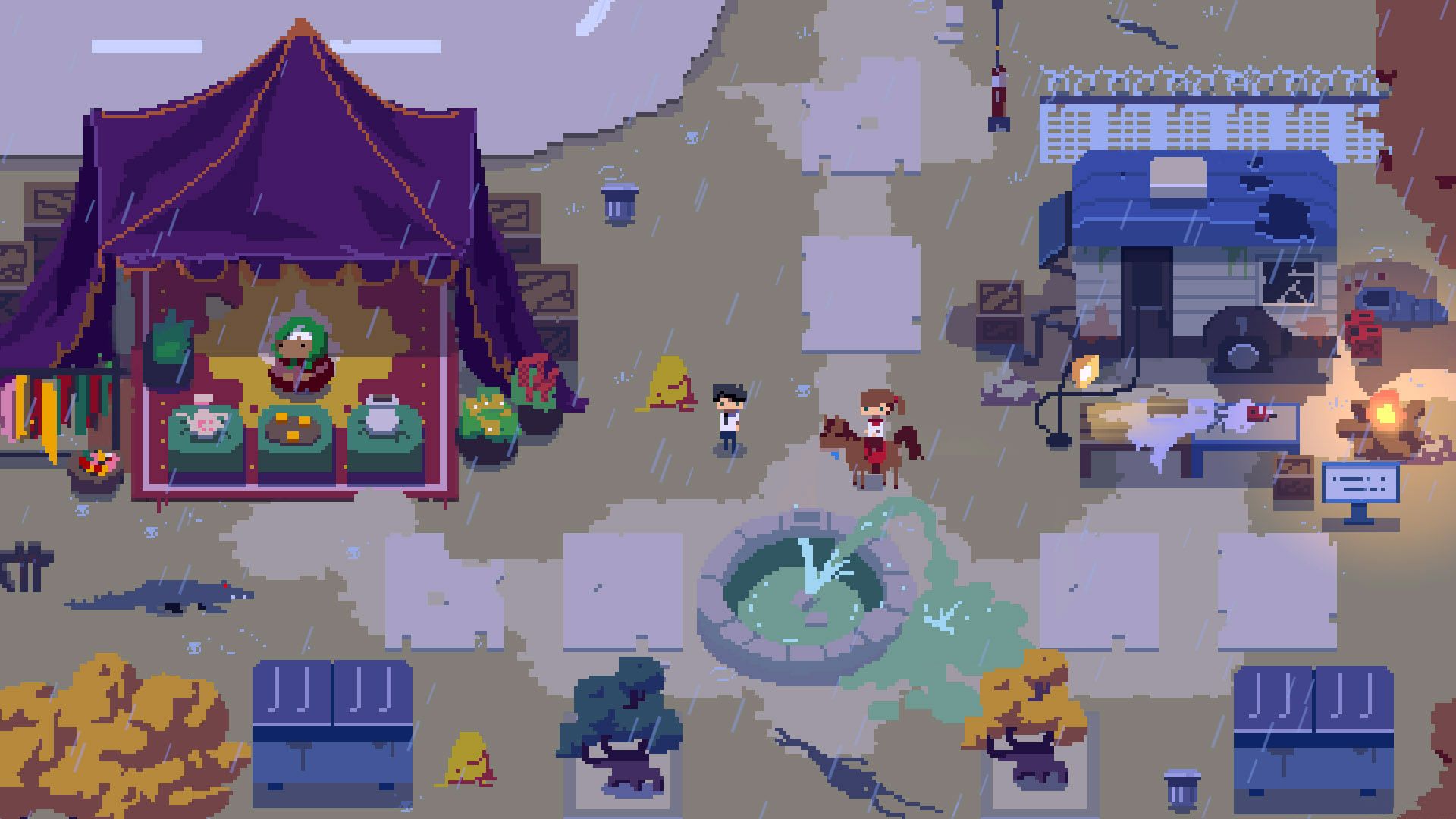
One thing we couldn't fix that the community has pointed out multiple times is they really weren't keen on the quick time events (QTE). It's so engrained in the game that we can't really take it out. We're prepared for people to complain a little about that at launch, but if it's all they dislike I'll be very happy.
Preuss: We implemented an easy mode so the QTEs aren't all that hard, too.
Maar: That's true, and that was based on the Discord community.
Preuss: We also have an invincibility mode for the boss fights, because again this is a casual game. We don't expect people to want to be that challenged, so if they just want to see the story they can turn that on.
Maar: It's not Dark Souls.
Q: Are there any other accessibility options that might be worthy of note?
Maar: Just easy mode and invincibility. Also, everything is written down and the dialogue has subtitles.
Q: I understand there's also a relationship system. What was the impetus for that, and how was it put together?
Maar: From the beginning I wanted people to get really engaged with the characters.
While we're not making a full-on dating sim, I wanted people to be able to spend more time with them and get to know them; get into weird situations. We have this system where, for example, you can go on dates with three people from the music club. Of course, Broccoli Girl had to be in there because I know people want to hang out with her and go on a date. So you can go to the waterpark with her.
The way it works is you go on their side quests first, and then they'll ask you if you want to go with them to the waterpark, to the movies, to a fair. On a certain day you can go, and the bus picks you up so you go to a separate area.
Q: Does it affect the game in any way, like with multiple endings? Or can you just do a lot of dates to get character interactions?
Maar: There's no different endings, but you do get friendship badges from completing dates and side quests. Those are used to upgrade bottlemachines so you can make money, and with the money you can buy more furniture for your room and so on. It's also this completionist thing, it's nice to collect.
Preuss: But it doesn't have a real impact on the main storyline.
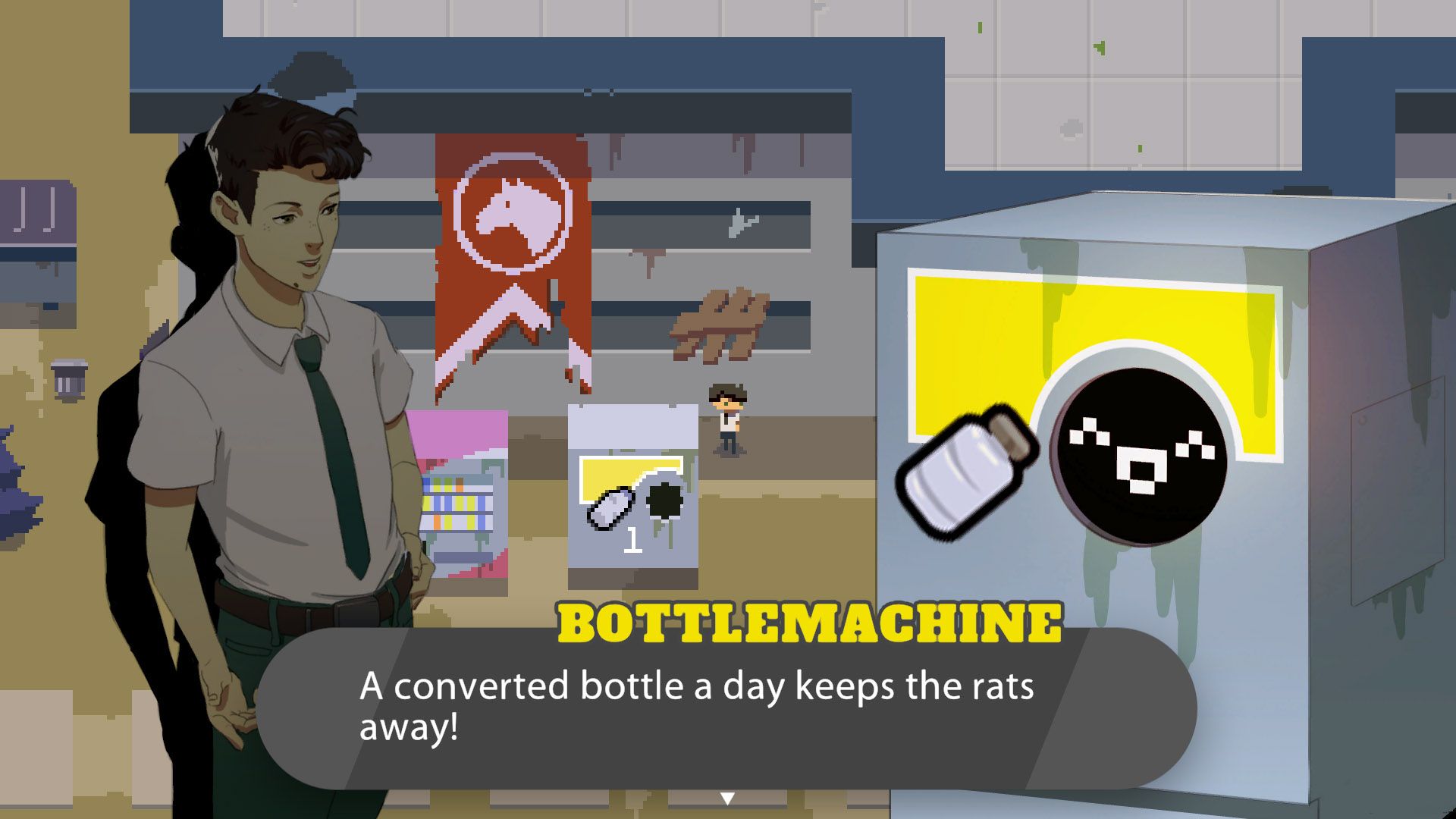
Q: In terms of that story, how did you balance the off-kilter supernatural elements with more basic high school slice-of-life kind of anime tropes?
Maar: It's important to have the balance right of crazy things to normal, because if everything is crazy than it's not that crazy anymore, not that impressive. You need to have something very normal by contrast to make it funny.
I think it helps that you start out each quest in a classroom, so it's very classic school life. For example, the art quest - I always think of the art quest, I don't know.
Preuss: You love that one.
Maar: It's my favorite!
But anyway, there the teacher says, "Why don't you, as the new guy, give the students critiques on their art pieces." That's a very real situation, same with the art exhibition you go to. But then, obviously, things turn out very differently than how you expected and crazy things have a bigger impact because they started out so normal.
Q: Do both of you have specific favorite parts of the game?
Maar: I love the art quest, the Ace Attorney bits, I think they're really cool. Also I love the janitor, he's my favorite character and he's so funny.
Preuss: He's always running around with his bike, it is really funny. My favorite part is the sports quest actually, because there's a lot of minigames and also because there's a lot of different areas with things happening. I think the humor and jokes in the sports part are super funny.
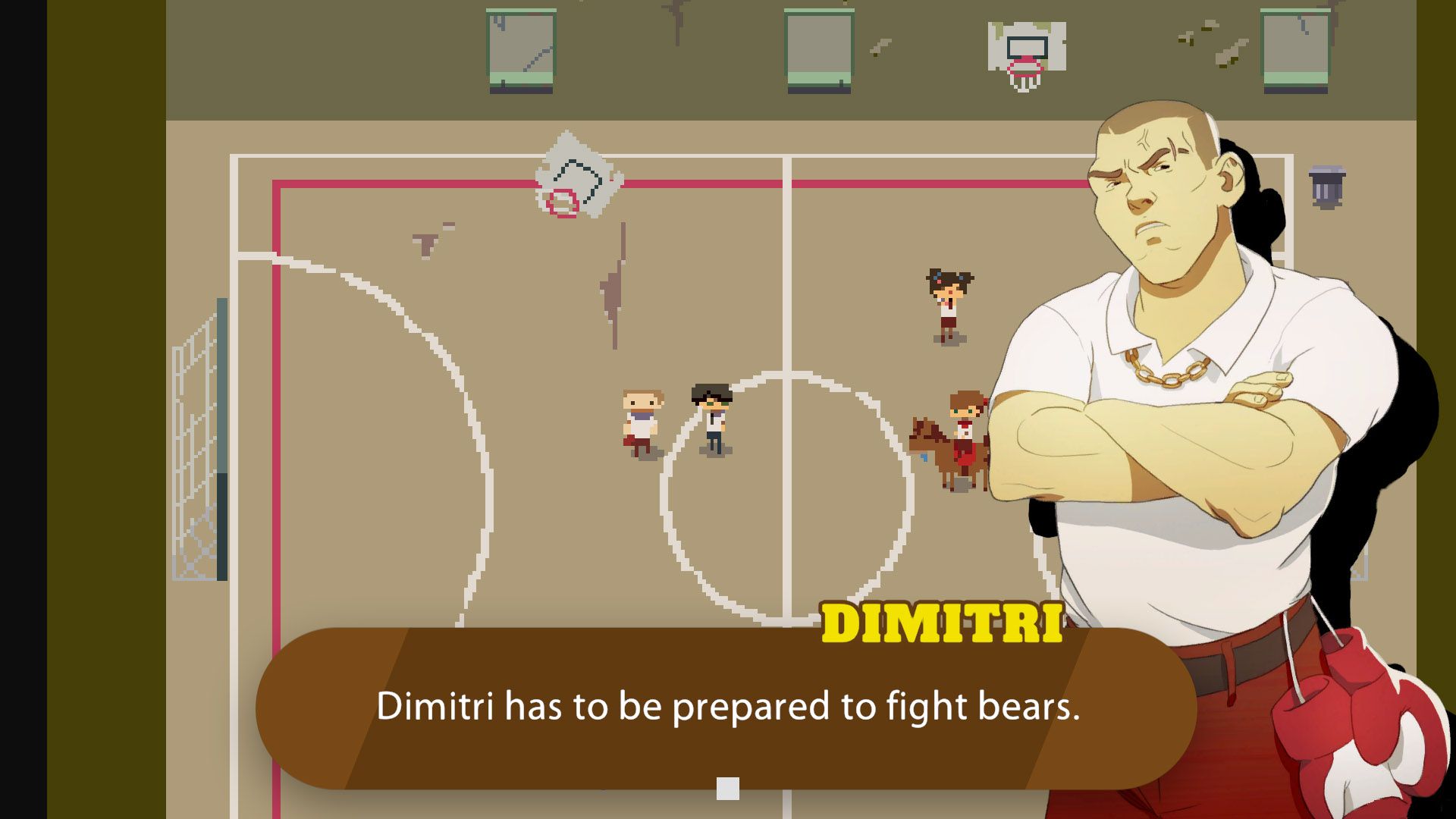
I don't really want to say too much because I don't want to spoil it, but there's a networking event and it's really hilarious.
Maar: I think it's because it's so relatable for us, so many start-up people there. Like a games industry party.
Q: So your team is based out of Berlin. What is the German video game scene like?
Preuss: Simulation games are more common in Germany, usually, but here in Berlin we have a very cool indie scene. There's a lot of narrative games or titles that are doing well in the US. Death Trash just came out a few weeks ago, it's like a sci-fi cyberpunk adventure game, also with pixel art.
I wouldn't say indie games here are too different from video games in the US to be honest. We have the same influences, the world is very globalized right now, right? Maybe when it comes to the size of the studios or things behind the scenes, it's a little different between the US and Germany, but the content of the games are quite similar.
Maar: But we're really lucky with public funding here in Germany, I think that makes it a lot easier for smaller devs to start out even if you don't have big funding yet.
Preuss: There's a lot of opportunities here.
Q: In terms of that public funding, how exactly does it work? Are there specific requirements that come with it?
Maar: They basically double your budget. They give you 50 percent and you need to have the rest yourself.
Preuss: Which can also come from a publisher or a Kickstarter, they don't really mind so much as long as you can prove that you are able to fund the full project.
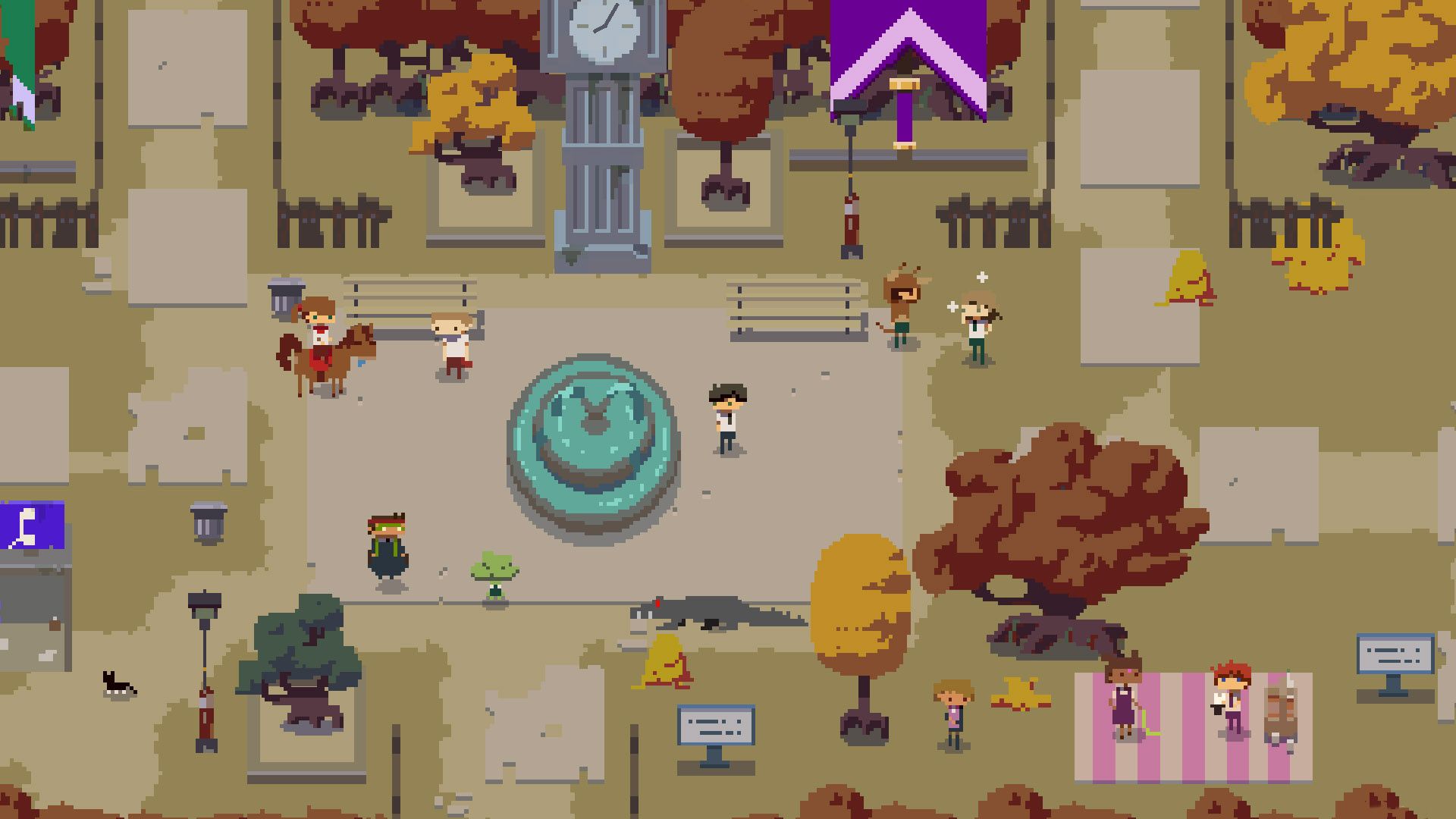
Maar: Yeah, their conditions are really good. If the game succeeds you have to pay back the loan, but if it doesn't then after so many years it gets written off. You're not going to indebt yourself.
Preuss: Every region is a bit different, so this is based on the Berlin fund. It's all more-or-less the same though, and within the state of Germany there's another, bigger fund, but it's targeted toward larger projects and companies. Every country in Europe has their own thing going on, but I think Germany is one of the best right now.
Q: We've talked briefly about the pixel art, but I wanted to ask how that came about and what it was like translating your more traditional fantasy style, Annika.
Maar: That was interesting because I haven't done pixel art before this. When I started out with the game I was trying to figure out how I, a single person, could make sure I get it done with the art style I can do the quickest. Obviously I can't do my fully rendered art because that takes 40 hours to do - absolutely impossible. So I thought, "Pixel art should be quick right?"
I learned how to do that, and thankfully because I knew art fundamentals it was helpful. If you know color theory, that also translates when you do pixel art. That went really well, I have to say, I'm really happy with how it looks. Obviously it's very minimalistic and there's nothing crazy going on with shaders and this or that. But in terms of colors and shapes, I'm happy.
Q: Did you have any inspirations for the art style?
Maar: I played Hyper Light Drifter actually, just around the time when I started making it. I super love that style. Anytime I saw pixel art before there were always these short, stubby people and I never liked the look. I thought it was too cute and wouldn't match the dark humor I wanted for this game. Then I saw Hyper Light Drifter and thought, great, let's give everyone long legs.
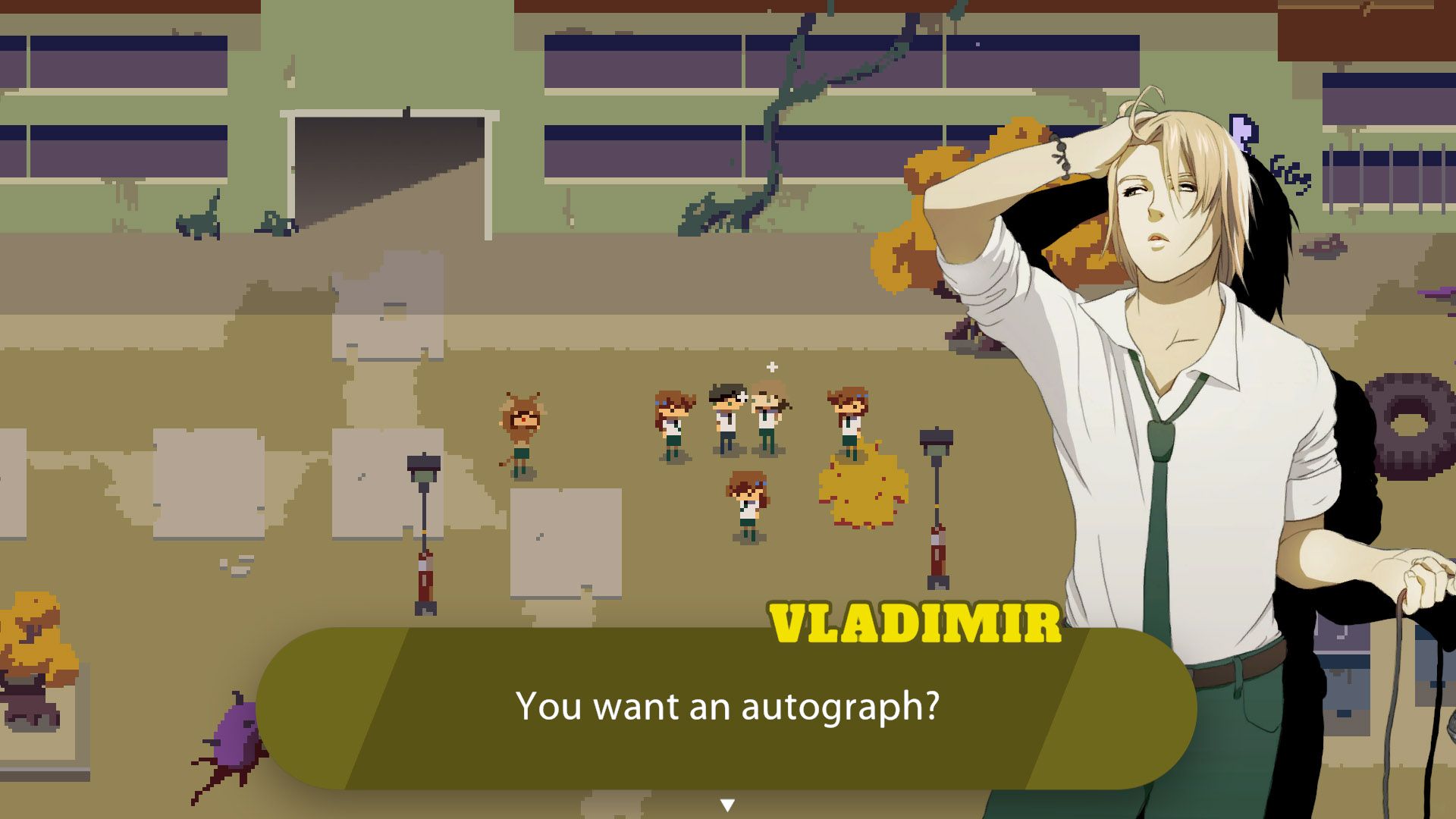
I also love the rectangular shapes it has everywhere, so I tried to incorporate that. Interestingly though, when we post something on Reddit, people compare it to Moonlighter. They always say it looks exactly like Moonlighter, though I hadn't played it at the time. I did play it later and love that game, it's super pretty, but it wasn't necessarily an inspiration.
Q: Were there any challenges in bringing this world to life through pixel art?
Maar: Definitely. When there are cutscenes where I want to show something more dramatic, obviously I don't have that much to work with. I can't show much emotion in the little pixel art, and even for character portraits I only have a set amount to where they're happy, sad, surprised, or angry. They can't be anything else, and then I just have the text. I really enjoy visual comedy, but I can't do anything subtle like having someone look the other way or roll their eyes.
I think that's why there's so much fire in the game, because that's something big I can show. I love explosions, it has to be super over-the-top.
Q: In terms of marketing, what's been your strategy to stand out from other indie games coming out?
Preuss: We've done all the standard things like going to events and submitting the game demo to Steam, using social media, having a Discord community. More specifically, the animated trailer that we showed at the Guerrilla Collective during E3 was a big strategy point. We did a streamer campaign as well around that time, where we contacted dozens of streamers who played the game. We're going to have another streamer campaign at launch.
We've also done merch, we have a Broccoli Girl plushie, stickers, and pins. We usually send them as a thank you gift to people who played the game or collaborated with us, and we did some giveaways in our Discord.
We're going to have a fan art contest at launch as well, someone will be able to win a Broccoli Girl plushie. We love fan art so much, and we're excited to see what people come up with.
Maar: Oh, and we had an alternate reality game (ARG).
Preuss: But we're not supposed to say it. I'm joking, I'm joking. It's already in the past, but people might still find it.
Maar: People can still solve it, though it's really involved. We actually commissioned a friend to make it because we didn't have time, and they did an exceptional job. All the bespoke websites, the puzzles, they're really cool.
I think the main thing for us with marketing was figuring out what gets us excited. We didn't just want to do all the boring things like contacting press - that's important, but also, what's something we would love if we saw a game we really like? It's just not very tangible how much return we would get on merch or the ARG, and someone more traditional might throw it all into Facebook ads.
Preuss: The merch stuff is a lot of work, we have to pack it up with our hands every single time, even if that's time we could be spending on the game. But it's a lot of fun, we enjoy it and it's more personal.
Maar: It makes us happy when people are super excited about it.
Preuss: And obviously we also worked with a publisher, Fellow Traveller, who has a big stake in marketing. They helped us a lot, getting amazing deals with Steam and so on. Working with them has been amazing.
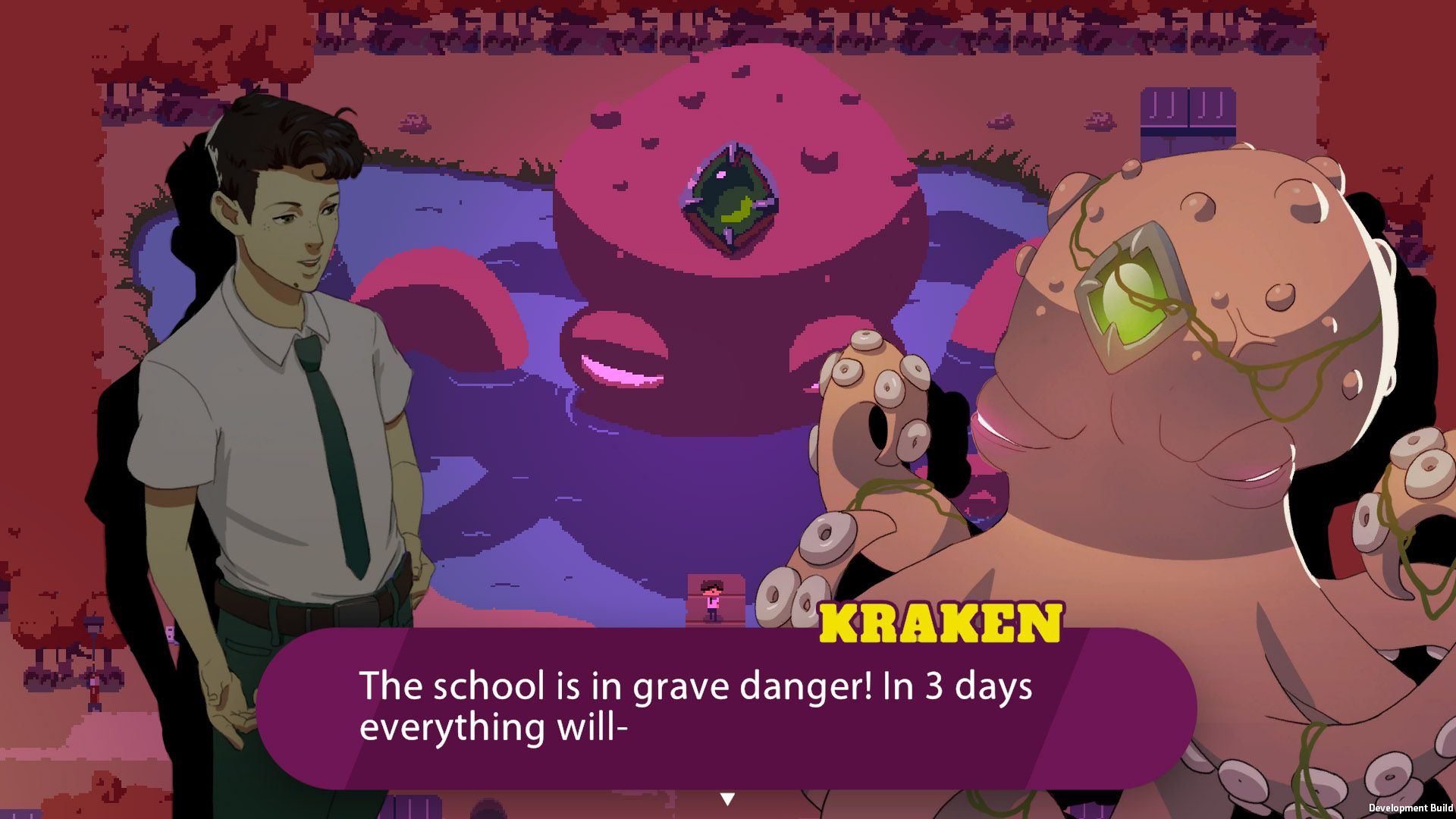
Q: I was not aware of the ARG, what was the spark behind that? How did it work?
Maar: From the beginning it was one of these things I really wanted, like the animated trailer. Originally I wanted something physical, a thing people could actually dig up. But then corona happened, so we couldn't do that. It had to be more boring, let's say.
We also wanted something that fits into the universe. There's a soda company in the game, Mepsi Corp., which is supposed to be this really evil, capitalistic company. We made the ARG around that, so people who go through it can also discover more lore around the game. I think it's really cool if people see that before they play and become familiar with it, so when they do play the game they're like, "Right, I get it now."
Preuss: It was super fun to watch streamers play the game for the first time, and then find the ARG and go down the rabbit hole.
Q: In terms of having this "evil, capitalistic company," are there a lot of ideals you were hoping to put across with the game? Or is it just more flavor?
Maar: I would say it's all very light. We never wanted to preach something with the game, it's meant to take you out of your problems. We didn't want to necessarily remind someone about all the awful things going on, and anything we talk about is never in a serious way. It's a dark humor jab.
Preuss: Very lighthearted.
Maar: We cover general things about friendship or imposter syndrome, etc.
Q: Even so, are there big things you hope people take away from playing Kraken Academy?
Maar: Things like, "Everything is going to be okay." Just because you are in a fight with someone or have these problems, you can always talk it out and it's going to be okay. No one is perfect, all of our characters are flawed - heavily flawed, but they're still lovable in a way.
Preuss: In a way it's quite wholesome, for sure.
Q: Now that this project is coming to an end, are there plans to do anything more with video games?
Maar: We're already starting right now, actually. We have a prototype, and it's going to be super exciting. It will be in the same universe, but not necessarily a sequel. We're still working everything out, so I don't want to say too much.
[END]
Kraken Academy is available now on PC

Post a Comment